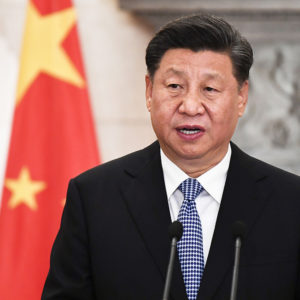China confronts incoming President-elect Joe Biden with possibly his most perplexing and most dangerous foreign policy issue while war clouds hang over the region from Northeast to Southeast and Central Asia to the Himalayan frontier.
China’s President Xi Jinping has left not the slightest doubt that the Chinese simply are not concerned about North Korea’s nuclear program.
He and his propaganda machine have repeatedly hailed China’s entry into the Korean War 70 years ago as a great moment in the history of both the People’s Republic of China and the Democratic People’s Republic of Korea, i.e., North Korea.
Xi has declared more than once that China would stand fast with North Korea in case the Americans jeopardize North Korea again.
To the Chinese, who sent several hundred thousand troops into North Korea to stop South Korean and U.S. forces from uniting all Korea, North Korea forms an essential barrier against foreign invasion across the Yalu (Amnok) and Tumen river frontiers into China’s northeastern provinces.
The American team, led by Biden’s pick for secretary of state, Antony Blinken, no doubt entertains familiar fantasies of Chinese cooperation on North Korea as have all American negotiators for decades, but the Chinese are going to use North Korea as a bargaining chip.
The Chinese game is to give the Americans the false impression that they might actually rein in North Korean leader Kim Jong-un if the Americans relented on their campaign to reduce the enormous trade surplus from which China reaps multi-billions of dollars from the U.S.
Chances of getting the Chinese really to act effectively in curbing the deficit are not good. Biden will find the challenge of dealing with China on trade as difficult as it was for Trump.
Biden will have to get much tougher if he thinks he can draw China down to much safer levels while complaining about a massive program for stealing industrial secrets and spreading propaganda everywhere from college campuses to the mass media.
As a taste of the depth of the problems, look at these comments by Terry Branstad, former U.S. ambassador to China, in a commentary submitted to the People’s Daily, the paper of the Chinese Communist Party, which refused to publish it.
Among the serious charges levelled by Branstad in his commentary was that Chinese firms buy huge shares in American industries not to profit from their investments but to uncover industrial secrets and take them back to China.
On American campuses, he wrote, Chinese professors and students mine still more secrets locked in files and programs that are untouchable if you don’t have the proper credentials from the institution.
It might be understandable for People’s Daily, as the mouthpiece of the ruling party, not to want to expose the masses to such trenchant criticism, but then consider the fact that China’s ambassador to the U.S., Cui Tiankai, a party stalwart, has written numerous commentaries for the Washington Post and other American publications.
Secretary of State Mike Pompeo was blunt in his denunciation of China’s campaign against foreign influence.
It all goes to show, he said, “how much China’s unelected Party elites fear their own people’s free-thinking and the free world’s judgment about their governance practices inside China.”
Fine words, but will Blinken, as Biden’s first secretary of state, be equally or perhaps more aggressive as needed in crises that now appear inevitable?
Trump’s director of national intelligence, John Ratcliffe, who got the post in May after much controversy over his conservative politics, minced no words in a commentary for the Wall Street Journal.
“China poses the greatest threat to America today, and the greatest threat to democracy and freedom world-wide since World War II,” he wrote.
Those words may appear extreme, but then consider the view of Cai Xia, a Chinese intellectual who once taught political theory to high-ranking party officials but was expelled from the party this year after having moved to the U.S.
“The CCP, having come to power in 1949 through violence, was deeply wedded to the idea that it had earned a permanent monopoly on political power,” she has written in the prestigious American journal Foreign Affairs.
Those words should be a reality check for those thinking Xi will urge Kim Jong-Un to get rid of his nukes and missiles while battling COVID-19 and terrible economic problems.
A test of Biden’s presidency will be his ability to stand up to rising threats from Beijing while solidifying alliances everywhere, notably South Korea and Japan.

